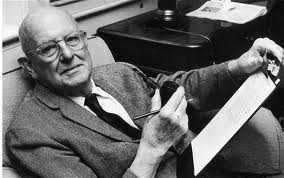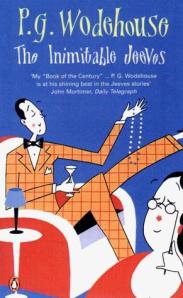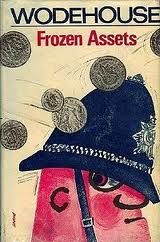Often comes the time when one does not wish to burden the mind with heavy books containing intricate plots and backgrounds that require a keen concentration by the reader, rather something to ease the mind and sooth the nerves. Such an objective cannot be achieved by reading a Tom Clancy action novel, or perhaps even a Dan Brown thriller, but something that goes slowly, brightens one up with lively yet subtle humor and never fails to lose the interest of the reader. Reading a book of this sort, is what is usually called Light Reading. Now, everyone has their own preference in light reading, because the requirement of nerves and mind to relax differs from person to person, but I think I will be doing a disfavor to my readers by not letting them know of my personal favorite light reading material. This material happens to be the work of the renowned British writer, P.G Wodehouse. Now, I’m sure many of you must already have heard this name and read many of his literary masterpieces, but for those who have yet to discover the wonders that his books have to offer, I will simply say that his books are based on typical British humor, and they never fail to cheer me up, even on a rainy day.
to ease the mind and sooth the nerves. Such an objective cannot be achieved by reading a Tom Clancy action novel, or perhaps even a Dan Brown thriller, but something that goes slowly, brightens one up with lively yet subtle humor and never fails to lose the interest of the reader. Reading a book of this sort, is what is usually called Light Reading. Now, everyone has their own preference in light reading, because the requirement of nerves and mind to relax differs from person to person, but I think I will be doing a disfavor to my readers by not letting them know of my personal favorite light reading material. This material happens to be the work of the renowned British writer, P.G Wodehouse. Now, I’m sure many of you must already have heard this name and read many of his literary masterpieces, but for those who have yet to discover the wonders that his books have to offer, I will simply say that his books are based on typical British humor, and they never fail to cheer me up, even on a rainy day.
The expressions that the writer makes use of, his singular tone, full of sarcasm and vigor, and the amusing interaction between his cleverly made characters are sure to bring a smile to the face of even the grimmest of people. In contrast to today’s comedy, many a times wrongfully called so, P.G Wodehouse’s books go on to show that one need not necessarily slip off a banana peel on the pavement to entertain an audience but that the subtle humor which is hidden in every sentence easily serves the purpose, rather in manner much more praiseworthy.
 P.G Wodehouse was brought up by aunts and butlers in his childhood, so any reader of his works will not fail to notice the major part these characters play in his novels. My personal favorite is the Jeeves-Wooster series, in which Bertram Wooster narrates many of his experiences with his faithful and highly intellectual butler, Jeeves. Wooster is depicted as a person who is not much appreciated in society as he is not considered to be the among the brightest of people, and often finds himself amidst a problem to which no solution is clear. In all such situation his Butler, whose mental capacities are much in contrast to those of Mr.Wooster, never fails to come up with a brilliant plan to solve the problem. The novels contain a narration of Mr.Wooster’s experiences
P.G Wodehouse was brought up by aunts and butlers in his childhood, so any reader of his works will not fail to notice the major part these characters play in his novels. My personal favorite is the Jeeves-Wooster series, in which Bertram Wooster narrates many of his experiences with his faithful and highly intellectual butler, Jeeves. Wooster is depicted as a person who is not much appreciated in society as he is not considered to be the among the brightest of people, and often finds himself amidst a problem to which no solution is clear. In all such situation his Butler, whose mental capacities are much in contrast to those of Mr.Wooster, never fails to come up with a brilliant plan to solve the problem. The novels contain a narration of Mr.Wooster’s experiences
 in such problems, and as I mentioned before the singular tone in which he narrates it never fails to brighten me up.
in such problems, and as I mentioned before the singular tone in which he narrates it never fails to brighten me up.
Another aspect of these books, that I find rather amusing is the difference in taste of clothing between Mr.Wooster and his butler. Mr.Wooster often gets piqued at his butler for not appreciating his taste in clothing, but in the end always has to accept defeat when Jeeves brilliantly solves another problem and Mr.Wooster realizes that he owes him this much. And the story often ends up with those articles of clothing either burned or given away somehow. Bertram’s relation with his aunts is rather interesting as well, considering how they look down upon him as a dim witted, fathead, other that one of his aunts, who happens to be his favorite, Aunt Dahlia. There are many other things that I admire about these books, but finding them out on your own will serve as a greater enjoyment. My favorite novels include The Inimitable Jeeves, Carry On Jeeves, Frozen Assets and many others. Do give his books a read and let me know if you like them, which I’m sure you will.
Happy Reading!